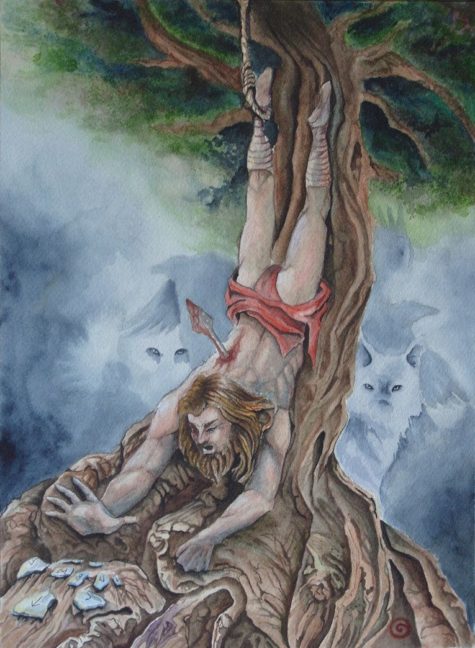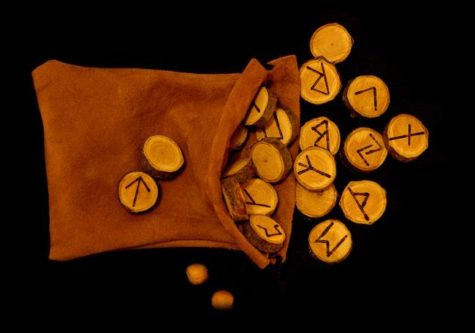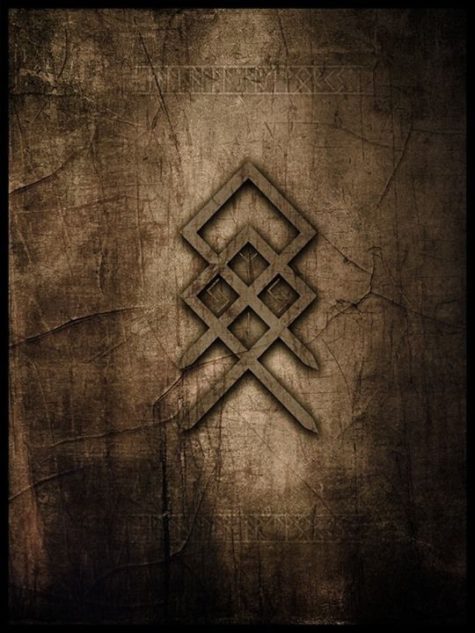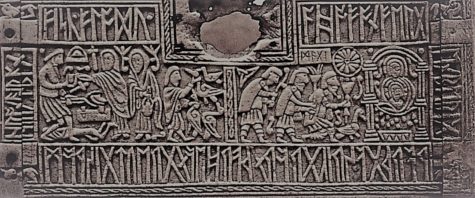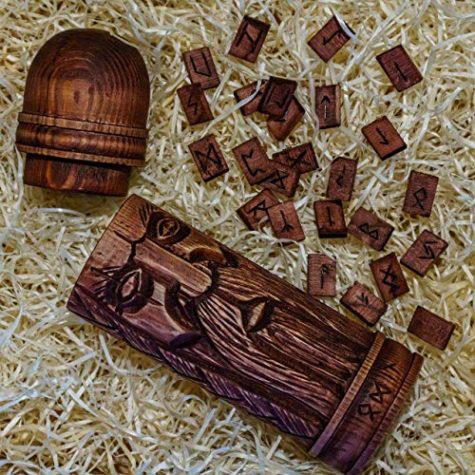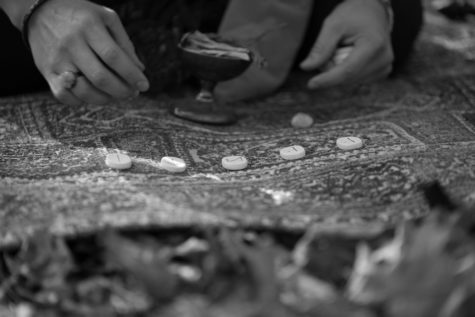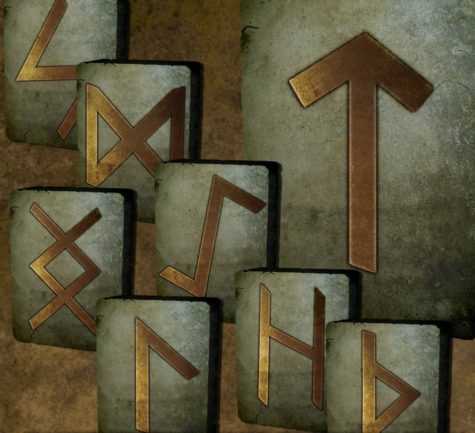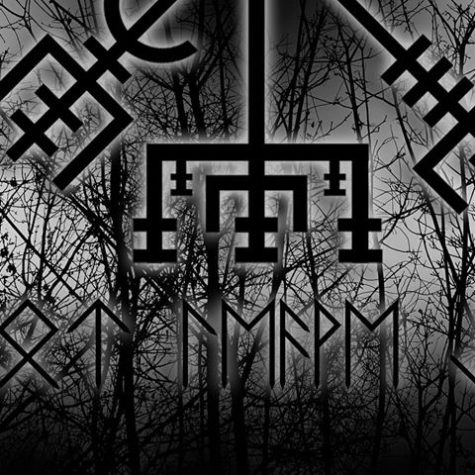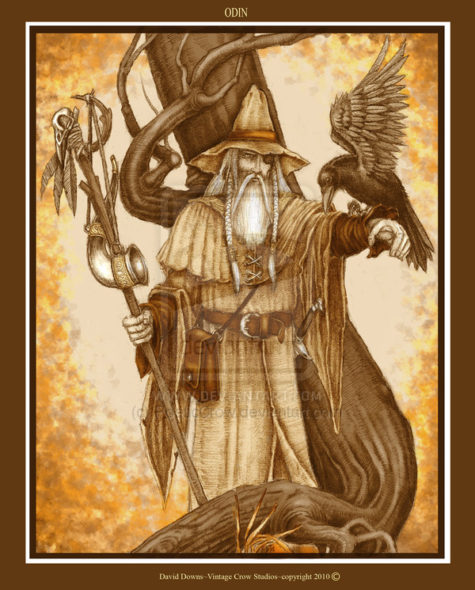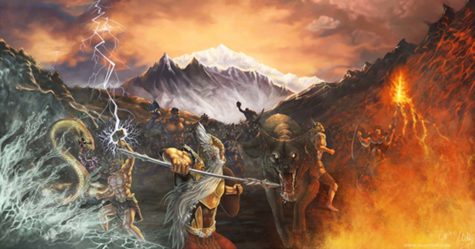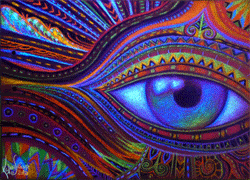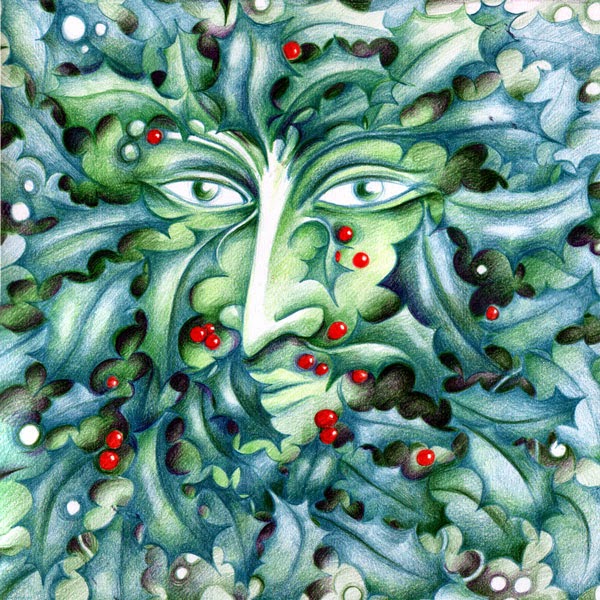Monthly Archives: March 2019
Odin’s Rune Song
Rúnatal or Óðins Rune Song, Rúnatáls-þáttr-Óðins (stanzas 139-146) is a section of the Hávamál where Odin reveals the origins of the runes. In stanzas 139 and 140, Odin describes his sacrifice of himself to himself:
138.
I wot that I hung on the wind-tossed tree
all of nights nine,
wounded by spear, bespoken to Óthin,
bespoken myself to myself,
[upon that tree of which none telleth
from what roots it doth rise]
139.
Neither horn they upheld nor handed me bread;
I looked below me–
aloud I cried–
caught up the runes, caught them up wailing,
thence to the ground fell again.
140.
From the son of Bolthorn, Bestla’s father,
I mastered mighty songs nine,
and a drink I had, of the dearest mead,
got from out of Óthrærir.
141.
Then began I to grow and gain in insight,
to wax eke in wisdom:
One verse led on to another verse,
one poem led on to the other poem.
142.
Runes wilt thou find, and rightly read,
of wondrous weight,
of mighty magic,
which that dyed the dread God,
which that made the holy hosts,
and were etched by Óthin.
143.
Óthin among Æsir, for alfs, Dain,
Dvalin for the dwarfs,
Alsvith among etins, (but for earth-borne men)
wrought I some myself.
144.
Know’st how to write, know’st how to read,
know’st how to stain, how to understand,
know’st how to ask, know’st how to offer,
know’st how to supplicate, know’st how to sacrifice?
145.
‘Tis better unasked than offered overmuch;
for ay doth a gift look for gain;
’tis better unasked than offered overmuch:
thus did Óthin write ere the earth began,
when up he rose in after time.
146.
Those spells I know which the spouses of kings
wot not, nor earthly wight:
“Help” one is hight, with which holpen thou’lt be
in sorrow and care and sickness.
147.
That other I know which all will need
who leeches list to be:
(on the bark scratch them of bole in the woods
whose boughs bend to the east).
148.
That third I know, if my need be great
to fetter a foeman fell:
I can dull the swords of deadly foes,
that nor wiles nor weapons avail.
149
that fourth I know, if foemen have
fettered me hand and foot:
I chant a charm the chains to break,
so the fetters fly off my feet,
and off my hands the halter.
150.
That fifth I know, if from foemans’s hand
I see a spear sped into throng,
never so fast it flies but its flight I can stay,
once my eye lights on it.
151.
That sixth I know, if me someone wounds
with runes on gnarled root written,
or rouses my wrath by reckless speech:
him blights shall blast, not me.
152.
That seventh I know, if o’er sleepers’ heads
I behold a hall on fire:
however bright the blaze I can beat it down–
that mighty spell I can speak.
153.
That eighth I know which to all men is
needful, and good to know:
when hatred runs high, heroes among,
their strife I can settle full soon.
154.
That ninth I know: if need there be
to guard a ship in a gale,
the wind I can calm, and the waves also,
and wholly soothe the sea.
155.
That tenth I know, if night-hags sporting
I scan aloft in the sky:
I scare them with spells so they scatter abroad,
heedless of their hides,
heedless of their haunts.
156.
That eleventh I know, if I am to lead
old friends to the fray:
under buckler I chant that briskly they fare
hale and whole to battle,
hale and whole from battle:
hale where ever they are.
157.
That twelfth I know, if on tree I see
a hanged one hoisted on high:
thus I write and the runes I stain
that down he drops
and tells me his tale.
158.
That thirteenth I know if a thane’s son I shall
wet with holy water:
never will he fall, though the fray be hot,
nor sink down, wounded by sword.
159.
That fourteenth I know, if to folk I shall
sing and say of the Gods:
Æsir and alfs know I altogether–
of unlearned few have that lore.
160.
That know I fifteenth which Thjóthrærir sang,
the dwarf, before Delling’s door:
gave to Æsir strength, to alfs victory
by his song, and insight to Othin.
161.
That sixteenth I know, if I seek me some maid,
to work my will with her:
the white-armed woman’s heart I bewitch,
and toward me I turn her thoughts.
162.
That seventeenth I know, (if the slender maid’s love
I have, and hold her to me:
this I sing to her) that she hardly will
leave me for other man’s love.
163.
In this lore wilt thou, Loddfáfnir, be
unversed forever and ay:
thy weal were it, if this wisdom thine–
’tis helpful, if heeded,
’tis needful, if known.
164.
That eighteenth I know which to none I will tell,
neither maid nor man’s wife–
’tis best warded if but one know it:
this speak I last of my spells–
but only to her in whose arms I lie,
or else to my sister also.
165.
Now are Hár’s sayings spoken in Hár’s hall,
of help to the sons of men,
of harm to the sons of etins;
hail to whoever spoke them, hail to whoever knows them!
Gain they who grasp them,
happy they who heed them!
Abecedarium Chronarium
Of all the Rune Poems I found, this one is my favorite. Rune poems are a way to remember the sound, shape, and symbolism of each individual Rune. The following poem is a modern take on the old poems.
- Fehu
Cows, like gold,
Flow from the king;
Generous with wealth,
Avoiding the wolf.
- Uruz
Aurochs show strength,
Drive out the dross.
The cosmic cow
Brings the rains.
- Thurisa
Thorns are sharp,
Painful to sit upon.
Giants bring illness,
Bad luck to women.
- Ansuz
Mouth begins language,
A wise start for all.
The All-Father comes
From the opening-place.
- Raido
Riding upon a horse,
Who carries you forth.
Worse for him than you,
But speedy for both.
- Kano
Torch blazes in the hall
Where folk find rest;
It burns to the touch,
And dangerous for children.
- Gebo
Gifts are the responsibility
of those who have much.
Generous folk are loved
and known by all.
- Wunjo
Joy comes from freedom,
Which lightens the load.
The gift of the unknown:
Not knowing brings bliss.
- Hagalaz
Hail is coldest of grains,
And death of serpents.
It beats the earth,
And melts into water.
- Nauthiz
Need gives no choice,
Hard work is its cure.
Children who learn from it
Will grow wise as they age.
- Isa
Ice is beautiful,
A sight to behold;
It is the roof of rivers,
And a danger to cross.
- Jera
Year is the patience,
The harvest we reap
At the end of our toils.
A blessing on the folk.
- Eihwaz
Yew, greenest of trees:
Upheld by deep roots
You guard the fire
And the bow bends in you.
- Perth
Dice-cup is the piece
Bringing laughter to all:
The luck of the roll
Shows them their fate.
- Algiz
Elk-sedge, sharp-tongued:
Protected by blades,
Growing in waters
At the edge of the land.
- Sowelu
Sun, the highest hope,
That lights the land;
Victory over the ice.
Shining ray, sky shield.
- Teiwaz
Tir is the north star,
Guiding the folk aright.
Truth and justice shine
Where his hand is placed.
- Berkana
Birch is the fertile one
Who grows when cut.
Branches reach skyward,
A strong crown of leaves.
- Ehwaz
Horses, joy of princes,
Give rest to the folk.
Prideful, beautiful,
Sacred to the gods.
- Mannaz
Man is joy to his fellow,
But one day he may fail.
Rejoice now in each other,
For the future is unknown.
- Laguz
Water wells up from below,
Flows from the mountain,
Shines with bright gold;
Seek treasures within.
- Inguz
Ing came from the east,
Hero and king to all.
Over the sea he traveled,
The world comes into bloom.
- Dagaz
Day is given unto us,
Rich and poor alike:
Filled with mirth and song,
A boon to the pious.
- Othila
Inheritance holds fast;
The ancestors bring forth
Wealth that never dies.
Joy and peace to the folk.
Meditations on the Anglo-Saxon Rune Poem
Rune poems were created as mnemonic aids for remembering the rune symbols, their names, meanings and properties. There are a number of runic poems, and the meanings given vary slightly with each rendition and translation. This one is a modern meditation on the Anglo-Saxon Rune Poem.
- Feoh: wealth
Wealth should flow,
constantly circulating
to promote the common good.
Sellers, buyers, investors, and the taxing authorities
portion out between them
the incomes of the folk.
Money sitting idle
causes only harm.
- Ur: the wild ox
One must grab life’s challenges by the horn’s
to ride the waves of one’s wyrd.
Before such a powerful one
the world becomes one’s domain.
- Thorn: the thorn
Computers crash
and planes fall out the skies.
That is the nature of things
and not always evil in intent.
Even good people sometimes cause
good people harm.
- Os: language
The worlds came into being thru
the crashing sounds of fire and ice.
Sound and the maker sounds
the divine word is spoken.
Wisdom and tradition
give comfort to the folk
in times of great changes.
- Rad: riding
When one sits in one’s home
everything looks so easy;
talk is easier than action.
To walk in another’s shoes
and do better,
that is a most difficult task.
- Cen: the torch
The inner light which is never extinguished
brightens the dark weary world.
This body is a great hall;
the mind sits in the body’s high seat.
The call to faith
a torch carrying procession.
- Gyfu: the gift
The giver and the giftee
form a circle of obligation.
As these are the bonds
which form true community.
Tho one can give too much
and receive that which one doesn’t want.
- Wyn: joy
It is bliss to reach the state of happiness:
no suffering, no sorrows, great joy.
To have the necessities of life
and to be able to help others.
Even in a reversal of fortune
one who is truly free
can still find joy
in this world and in other realms.
- Haegl: hail
Even a good life has its days.
As a hard rain good for the crops
turns to a hail storm that flattens them.
Even then the bad times don’t last;
even the thickest hail
melts away.
- Nyd: need
Need is the manifestation of desire;
the bondage of will to the external object.
It can be oppressive
but it can also be the key to liberation.
In organizing with others
bonds of oppression can be broken.
- Is: ice
Ice driven back by fire;
mists of crashing cosmic forces.
A space for the nine worlds was created
along with the body (ice)
and the energies (fire).
- Ger: the year
The sky wolves have retreated;
Sunna warms the land below.
Freyr and Freya have
bestowed upon us a great bounty
for all the folk.
- Eoh: the yew
Symbol of Yggdrasil
the yew is strong
and holds many worlds within its branches.
It offers much support
to those who grow it.
- Peorth: the hall
In the shelter of the world tree
many great halls have been built.
So that all peoples can go
to be with their patron deity
according to the rules of their faith.
No one can be excluded from the protection of the Tree
save those who exclude themselves
by evil deeds.
- Eolhx: a water plant that bites
Even a plant can cause harm
if used without caution;
danger lurks even in the safest place.
- Sigel: the sun
Sunna is the goddess of hope.
She points out the way
and gives us the energy for life’s work.
- Tir: a star
Tyr is the way.
He is the sky father
who guides us
thru life winding paths,
never abandons us
to darkness.
- Beorc: the birch
Your green leaves bloom early
giving us knowledge
that Spring has come again.
- Eh: the horse
Embodiment of godly power
thought the body of the horse
people share its might.
- Man: the human being
Be happy in life.
Bring happiness to your friends
and relations.
Yet be aware that death is always waiting.
- Lagu: the sea
The sea is the cauldron of chaos;
creative matrix,
playground of Ran,
from which human beings came.
- Ing: the god of fertility
He moves across the lands;
visiting his farmer friends
giving gifts of great bounty.
Ethel: native land
One loves the land they live upon
sharing in its rights and duties.
Thus the land protects its friends
if its friends respect it.
- Daeg: the day
We shine in the light of the deities.
Tho day is followed by night;
life by death,
we know that after night comes a new day.
So death is followed by new life
in whatever way that arises.
- Ac: the oak
The daughter of the great tree
she provides us and animals
with food and shelter.
- Aesc: the ash
Like the mighty ash
may we have the power
to withstand the attacks
of our enemies
- Yr: the bow
Getting on a jet
I fly straight as an arrow
to my destination.
- Iar: a sea creature
The world serpent has us all
in its grip;
lord of eternity
the cycle of birth and death.
- Ear: the clay
Death is the end of all.
Even the most powerful
and wealthy people
are seized in the end.
Yet don’t despair,
for life goes on
and so do all which die
come back to some form of life.
Abcedarium Nordmanicum
There is yet another rune poem, the Abcedarium Nordmanicum, discovered in a manuscript written in the 9th century, written in high and low German. This is sometimes referred to as the “Old Swiss Rune Poem”. It relates to the Younger Futhark.
Fee first,
Aurochs after,
Thurs the third stave,
The Åse is above him,
Wheel is written last,
Then cleaves cancre;
Hail has need;
Ice, year, and sun.
Tiu, birch and man in the middle;
Water the bright,
Yew holds all.
The Anglo-Saxon Rune Poem
Rune poems were created as mnemonic aids for remembering the rune symbols, their names, meanings and properties. There are a number of them, and the meanings given vary slightly with each rendition and translation. This comes from the Anglo-Saxon tradition, and has been rendered in modern English.
- Feoh
Wealth is a comfort to all men;
yet must every man bestow it freely,
if he wish to gain honour in the sight of the Lord.
- Ur
The aurochs is proud and has great horns;
it is a very savage beast and fights with its horns;
a great ranger of the moors, it is a creature of mettle.
- Thorn
The thorn is exceedingly sharp,
an evil thing for any knight to touch,
uncommonly severe on all who sit among them.
- Os
The mouth is the source of all language,
a pillar of wisdom and a comfort to wise men,
a blessing and a joy to every knight.
- Rad
Riding seems easy to every warrior while he is indoors
and very courageous to him who traverses the high-roads
on the back of a stout horse.
- Cen
The torch is known to every living man by its pale, bright flame;
it always burns where princes sit within.
- Gyfu
Generosity brings credit and honour, which support one’s dignity;
it furnishes help and subsistence
to all broken men who are devoid of aught else.
- Wynn
Bliss he enjoys who knows not suffering, sorrow nor anxiety,
and has prosperity and happiness and a good enough house.
- Haegl
Hail is the whitest of grain;
it is whirled from the vault of heaven
and is tossed about by gusts of wind
and then it melts into water.
- Nyd
Trouble is oppressive to the heart;
yet often it proves a source of help and salvation
to the children of men, to everyone who heeds it betimes.
- Is
Ice is very cold and immeasurably slippery;
it glistens as clear as glass and most like to gems;
it is a floor wrought by the frost, fair to look upon.
- Ger
Summer is a joy to men, when God, the holy King of Heaven,
suffers the earth to bring forth shining fruits
for rich and poor alike.
- Eoh
The yew is a tree with rough bark,
hard and fast in the earth, supported by its roots,
a guardian of flame and a joy upon an estate.
- Peordh
Peorth is a source of recreation and amusement to the great,
where warriors sit blithely together in the banqueting-hall.
- Eolh
The Eolh-sedge is mostly to be found in a marsh;
it grows in the water and makes a ghastly wound,
covering with blood every warrior who touches it.
- Sigel
The sun is ever a joy in the hopes of seafarers
when they journey away over the fishes’ bath,
until the courser of the deep bears them to land.
- Tir
Tir is a guiding star; well does it keep faith with princes;
it is ever on its course over the mists of night and never fails.
- Beorc
The poplar bears no fruit; yet without seed it brings forth suckers,
for it is generated from its leaves.
Splendid are its branches and gloriously adorned
its lofty crown which reaches to the skies.
- Eh
The horse is a joy to princes in the presence of warriors.
A steed in the pride of its hoofs,
when rich men on horseback bandy words about it;
and it is ever a source of comfort to the restless.
- Mann
The joyous man is dear to his kinsmen;
yet every man is doomed to fail his fellow,
since the Lord by his decree will commit the vile carrion to the earth.
- Lagu
The ocean seems interminable to men,
if they venture on the rolling bark
and the waves of the sea terrify them
and the courser of the deep heed not its bridle.
- Ing
Ing was first seen by men among the East-Danes,
till, followed by his chariot,
he departed eastwards over the waves.
So the Heardingas named the hero.
- Ethel
An estate is very dear to every man,
if he can enjoy there in his house
whatever is right and proper in constant prosperity.
- Dæg
Day, the glorious light of the Creator, is sent by the Lord;
it is beloved of men, a source of hope and happiness to rich and poor,
and of service to all.
- Ac
The oak fattens the flesh of pigs for the children of men.
Often it traverses the gannet’s bath,
and the ocean proves whether the oak keeps faith
in honourable fashion.
- Æsc
The ash is exceedingly high and precious to men.
With its sturdy trunk it offers a stubborn resistance,
though attacked by many a man.
- Yr
Yr is a source of joy and honour to every prince and knight;
it looks well on a horse and is a reliable equipment for a journey.
- Ior
Iar is a river fish and yet it always feeds on land;
it has a fair abode encompassed by water, where it lives in happiness.
- Ear
The grave is horrible to every knight,
when the corpse quickly begins to cool
and is laid in the bosom of the dark earth.
Prosperity declines, happiness passes away
and covenants are broken.
From : Runic and Heroic Poems, by Bruce Dickins.
The Icelandic Rune Poem
Rune poems were created as mnemonic aids for remembering the rune symbols, their names, meanings and properties. This one has been rendered in modern English.
- Fé – Wealth
Source of discord among kinsmen
and fire of the sea
and path of the serpent.
- Úr – Shower
Lamentation of the clouds
and ruin of the hay-harvest
and abomination of the shepherd.
- Thurs – Giant
Torture of women
and cliff-dweller
and husband of a giantess.
- Óss – God
Aged Gautr
and prince of Ásgardr
and lord of Vallhalla.
- Reid – Riding
Joy of the horsemen
and speedy journey
and toil of the steed.
- Kaun – Ulcer
Disease fatal to children
and painful spot
and abode of mortification.
- Hagall – Hail
Cold grain
and shower of sleet
and sickness of serpents.
- Naud – Constraint
Grief of the bond-maid
and state of oppression
and toilsome work.
- Iss – Ice
Bark of rivers
and roof of the wave
and destruction of the doomed.
- Ár – Plenty
Boon to men
and good summer
and thriving crops.
- Sól – Sun
Shield of the clouds
and shining ray
and destroyer of ice.
- Tyr – Tyr (The God)
God with one hand
and leavings of the wolf
and prince of temples.
- Bjarken – Birch
Leafy twig
and little tree
and fresh young shrub.
- Madr – Man
Delight of man
and augmentation of the earth
and adorner of ships.
- Lögr – Water
Eddying stream
and broad geyser
and land of the fish.
- Yr – Yew
Bent bow
and brittle iron
and giant of the arrow.
From: Runic and Heroic Poems by Bruce Dickins
The Old Norse Rune Poem
Rune poems were created as mnemonic aids for remembering the rune symbols, their names, meanings and properties. Here is a very old Runic poem:
- Fe
Wealth is a source of discord among kinsmen;
the wolf lives in the forest.
- Ur
Dross comes from bad iron;
the reindeer often races over the frozen snow.
- Thurs
Giant causes anguish to women;
misfortune makes few men cheerful.
- As
Estuary is the way of most journeys;
but a scabbard is of swords.
- Reidh
Riding is said to be the worst thing for horses;
Reginn forged the finest sword.
- Kaun
Ulcer is fatal to children;
death makes a corpse pale.
- Hagall
Hail is the coldest of grain;
Christ created the world of old.
- Naudhr
Constraint gives scant choice;
a naked man is chilled by the frost.
- Isa
Ice we call the broad bridge;
the blind man must be led.
- Ar
Plenty is a boon to men;
I say that Frodi was generous.
- Sol
Sun is the light of the world;
I bow to the divine decree.
- Tyr
Tyr is a one-handed god;
often has the smith to blow.
- Bjarkan
Birch has the greenest leaves of any shrub;
Loki was fortunate in his deceit.
- Madhr
Man is an augmentation of the dust;
great is the claw of the hawk.
- Logr
A waterfall is a River which falls from a mountain-side;
but ornaments are of gold.
- Yr
Yew is the greenest of trees in winter;
it is wont to crackle when it burns.
From: Runic and Heroic Poems by Bruce Dickins
The Runes of Power
From the “Poetic” Edda, one of the primary written sources for Norse mythology, here is one translation of the Havamàl which speaks about the runes and runic power.
Do you know, how to carve them?
Do you know, how to read them?
Do you know, how to color them?
Do you know, how to understand them?
Do you know, how to pray?
Do you know, how to sacrifice?
Do you know, how to send?
Do you know, how to discard?
Better not to pray at all,
than to sacrifice too much.
A gift requires a gift in return.
Better not to send at all,
than to counteract too much.
Thus carved Thund before time,
when he rose, when he returned.
The Havamàl
The Havamàl is part of the Elder or “Poetic” Edda, which is one of the primary written sources for Norse mythology. This excerpt from the W. H. Auden and P. B. Taylor translation of the Havamàl contains Odin’s telling of how he obtained the runes and runic power.
Wounded I hung on a wind-swept gallows
For nine long nights,
Pierced by a spear, pledged to Odin,
Offered, myself to myself
The wisest know not from whence spring
The roots of that ancient rood.
They gave me no bread,
They gave me no mead,
I looked down;
With a loud cry
I took up runes;
From that tree I fell.
Nine lays of power
I learned from the famous Bolthor, Bestla’ s father:
He poured me a draught of precious mead,
Mixed with magic Odrerir.
Waxed and throve well;
Word from word gave words to me,
Deed from deed gave deeds to me.
Runes you will find, and readable staves,
Very strong staves,
Very stout staves,
Staves that Bolthor stained,
Made by mighty powers,
Graven by the prophetic God.
For the Gods by Odin, for the Elves by Dain,
By Dvalin, too, for the Dwarves,
By Asvid for the hateful Giants,
And some I carved myself:
Thund, before man was made, scratched them,
Who rose first, fell thereafter.
Know how to cut them,
know how to read them,
Know how to stain them,
know how to prove them,
Know how to evoke them,
know how to score them,
Know how to send them,
know how to send them.
Better not to ask than to over-pledge
As a gift that demands a gift.
Better not to send
Than to slay too many.
Norse Mythology ~ Simplified
Creation
In the beginning was Muspell, the realm of fire. It is a place of dreadful light and heat. Only its natives, the Fire Giants, can tolerate its flames. Surt, a Fire Giant, guards Muspell’s border, armed with a flaming sword. At the end of the era, at Ragnarok, Surt and his companions will destroy all the Gods and and their world with fire.
Outside of Muspell lies the void called Ginnungagap, and north of Ginnungagap is Niflheim, the world of awesome dark and cold. In this world are eleven rivers flowing from a great well. The rivers are frozen and occupy Ginnungagap. When the wind, rain, ice, and cold meet the heat and fire of Muspell in the center of Ginnungagap, a place of light, air, and warmth is born.
Where fire and ice first met, thawing drops appeared. Beneath the melting ice lay a Frost Giant named Ymir. Ymir slept, falling into a sweat. Under his left arm there grew a couple, male and female Giants. One of his legs begot a son with the other.
The melting frost became a cow called Audhumla from whose udders ran four rivers of milk that fed Ymir.
After one day of licking salty ice blocks, she freed a man’s hair from the ice. After two days, his head appeared. On the third day the whole man was released from the ice. The man’s name was Buri. Buri had a son named Bor. Bor married Bestla, the daughter of a Giant, with whom he had three sons. Odin was the first, Vili the second, and Vé the third. Odin, in association with his brothers, is the ruler of heaven and earth. He is the greatest and most famous of all Gods.
Odin and his brothers killed the Giant Ymir. They carried Ymir to the middle of Ginnungagap and created the world, called Midgard, from his body. Ymir’s blood became the sea and and lakes. His skull became the cover of the sky which was set over the earth. Ymir’s brains were tossed into the air, and became clouds. Then sparks and burning embers from Muspell were placed in the middle of Ginnungagap to give light to Midgard. They named the stars and set their paths. Ymir’s skeleton became the mountains of Midgard. His teeth and jaws became rocks and pebbles. His flesh was ground into dirt in the great mill Grottekvarnen. Ymir’s hair became trees. Maggots appeared in Ymir’s flesh became Dwarves, who had human understanding and the appearance of men, but lived in the earth. Under each corner of the sky the suns of Buri put a Dwarf. The four Dwarves are called Austri (East), Vestri (West), Nordri (North), and Sudri (South).
Midgard
Midgard was surrounded by an enormous ocean. Odin, Vili and Vé gave lands along the coasts to the friendlier Giants, the Etin, for their settlements. From two trees they created a human man and woman. Odin gave the man and the woman spirit and life. Vili gave them understanding and the power of movement. Vé gave them clothing and names. The man was named Ask [Ash] and the woman Embla [Elm]. Ask and Embla are the ancestors of all humans in Midgard.
Asgard
Next they built Åsgard, the home of the Gods. In a hall named Hlidskjálf, Odin sits on a high seat from which he can look out over the whole world. Odin married Frigga, the daughter of the Giant Fjörgvin.
Yggdrasil
Yggdrasil, the World-Tree, the tree of fate, arises in the center of the Midgard. Its branches reach up over Asgard. The entire universe is dependent on the World-Tree. The tree has three three roots. One reaches into the underworld Hel, another to the world of the Frost-Giants, and the last one to the world of human beings. Beneath the tree is the Urda well, guarded by the Norns, the three Goddesses of Fate. Two other wells also feed Yggdrasil. One is called Hvergelmer, and the other is Mimer’s well. The dragon Nidhog lies in Hvergelmer and gnaws on the roots of the tree. Mimer’s well is the well of wisdom, guarded by the wisest of all beings, Mimer. Odin once gave his right eye for a drink of the water from this well.
Bifrost
The Gods built a bridge called Bifröst from Asgard (heaven) to Midgard (earth). They ride daily over the great rainbow bridge. Bifröst is guarded by the God Heimdall. Heimdall sleeps lighter than a bird, sees one hundred travel-days in each direction, and has such sharp ears that he can hear the grass and the wool grow. But as strong as Bifröst is, it will collapse when the when the Frost Giants ride out over it at Ragnarok. There is nothing that can be relied on when the sons of Muspell are on the warpath.
Gods & Goddeses
The Norse deities are divided into two major groups, the Aesir and the Vanir. The Vanir, the “Earth Gods”, symbolize riches, fertility, and fecundity. They are associated with the earth and the sea. The most important Gods of the Vanir are Njord, Freyr, Aegir and Freya.
The Aesir, the “Sky Gods”, symbolize power, wisdom, and war. They are long lived, but not immortal. Odin is the leader of the Gods, with magical skills. Thor, with his magic hammer, is the God of Thunder who presides over working men. Loki is a Giant who is an Aesir by adoption. He and Odin made a vow of friendship and became blood-brothers. Loki is a trickster, a shapeshifter, and a troublemaker.
In the distant past a fierce war was fought between the Aesir and the Vanir. The conflict between the Gods began when Odin and Thor refused to recognize the full status of Godhood to the Vanir. The Vanir sent a beautiful woman, Gullveig (gold-drink), to the Aesir, who tried to destroy her. She came back to life three times, and led to their corruption. War then broke out. After both sides were exhausted, each side exchanged members of its group with the other; the Vanir sent Njord and his son and daughter Freyr and Freya, the Aesir sent Mimir and Hoenir. The truce was celebrated by a meeting at which all the Gods spit into a bowl, creating a Giant called Kvasir, who is the sign of peace and harmony among the deities. Kvasir was later sacrificed and from his blood became a potent drink which inebriates deities and gives inspiration to poets.
Balder, one of the sons of Odin, appeared as the essence of intelligence, piety, and wisdom. Both Gods and men came to him to settle legal disputes, and his judgments were reconciling and fair. Balder had a dream in which his life was threatened. Upon reporting this dream to his mother, Frigga, she exacted an oath from fire, water, metals, earth, stones, and all birds and animals. They swore they would not harm Balder. Because of his immunity, the Aesir used Balder as a target in games, throwing darts and stones at him. When Loki saw this, he disguised himself as a woman and asked Frigga why Balder suffered no harm. Frigga told him of the oath. Loki tricked her into telling him that mistletoe was the only being that did not agree to the oath. Loki immediately took mistletoe and created arrows. He took the arrows to the Blind God Hoder, brother of Balder, and volunteered to direct his aim so that he would participate in the game. When the mistletoe struck Balder, Balder fell dead.
Because Balder was not a warrior and did not die in battle, he did not go to Valhalla, the hall of slain heroes, but into the domain of Hel, Keeper of the Dead. When Odin begged his release, Hel (Loki’s daughter) responded that if everything in the world both dead and alive wept for Balder, then he could return to the Aesir. If not, he would remain with Hel. The Aesir sent messengers throughout the world asking all to weep for Balder. All responded except a Giantess, Thokk (Loki in disguise), whose refusal to weep forced Balder to remain in Hel’s domain. The Aesir succeeded in capturing Loki. To punish him for his many crimes, they chained him beneath a serpent, which dripped venom onto him, causing terrible pain.
Ragnarok
The Ragnarok, or end of the world, has been prophesied. When Mirmir no longer guards his well, Yggdrasil’s root will begin to rot. The Nidhog dragon will finally succeed in knawing through the root that ends at Hvergelmer well. The Norns will be alarmed at the pollution of the Urdh well and the yellowing of the leaves of the world tree. Odin’s sacrificed eye lies in Mirmir’s well and sees what is to come. He knows that nothing can stop Fibulwinter, three years with endless winter, which will be followed by Ragnarok.
The days will grow colder until even Urda well freezes solid. Storm and sleet will pound the World-Tree. One of Yggdrasil’s branches will break and fall, striking Jormungand, the world serpent, which immediately will let go of its tail. The Hel ship Naglfar will become visible in the mist. The wolves Skoll and Manegarm will get closer and closer to Sun and Moon, which they have chased for eons. Fenrir wolf and and the Hel-wolf Garm will break their chains. Giants will release Loki from his fetters on the mountain. Nidhoggr will leave the roots of Yggdrasil and head toward Asgard. Behind him will march all the Giants. Heimdall will see all this, and will take up the Gjallarhorn to blow the warning.
Loki will lead monsters and Giants to attack the Gods in the great battle of Ragnarok on Vigrid plain. The leader of the Fire Giants, Surt, will attack Freyr, who will be armed only with a deer’s antler. Freyr will stick his deer horn through Surt’s eye, but then Surt will kill him with his flaming sword. Thor’s son Magni will send a killing arrow toward Nidhoggr’s head. Side by side, Odin and Thor will fight Fenrir and Jormungand. Odin will put his spear, Gungnir, in Fenrir’s chest, but the wolf will crush Odin to the ground. Thor will kill Jormungand with his hammer, Mjollnir, but then will take nine steps backwards and fall down, poisoned by the serpent’s venom. Tyr will kill the wolf dog Garm. Vidar will take revenge for Odin. The enemies Loki and Heimdall will their spears at each other at the same time and both will die. Modi will be surrounded by Giants, but Magni and Vidar will rescue him.
The winds will increase and blow Yggdrasil from every direction until the great World-Tree falls. The Dark Elves forge will tip and the World-Tree will burn. The Bifrost Rainbow Bridge will collapse and one by one each of the Worlds will fall. The remaining Aesir will escape in Freyr’s ship, Skidbladnir. It will be almost taken by the Hel-ship Naglfar. Midgard will then be destroyed by fire, and will sink back into the sea.
This final destruction will be followed by a rebirth, the Earth reemerging from the sea. Seven sons of the dead Aesir will return to Asgard and rule the universe.
From: Sunnyway
James Cheney: Invocation To The Dark Mother
Daniel: Prayer Before The Final Battle
blessed obyno: Queen of Ghosts
blessed obyno: Queen of Ghosts
Caerlion Arthur: The Great, Bloody and Bruised Veil of the World
